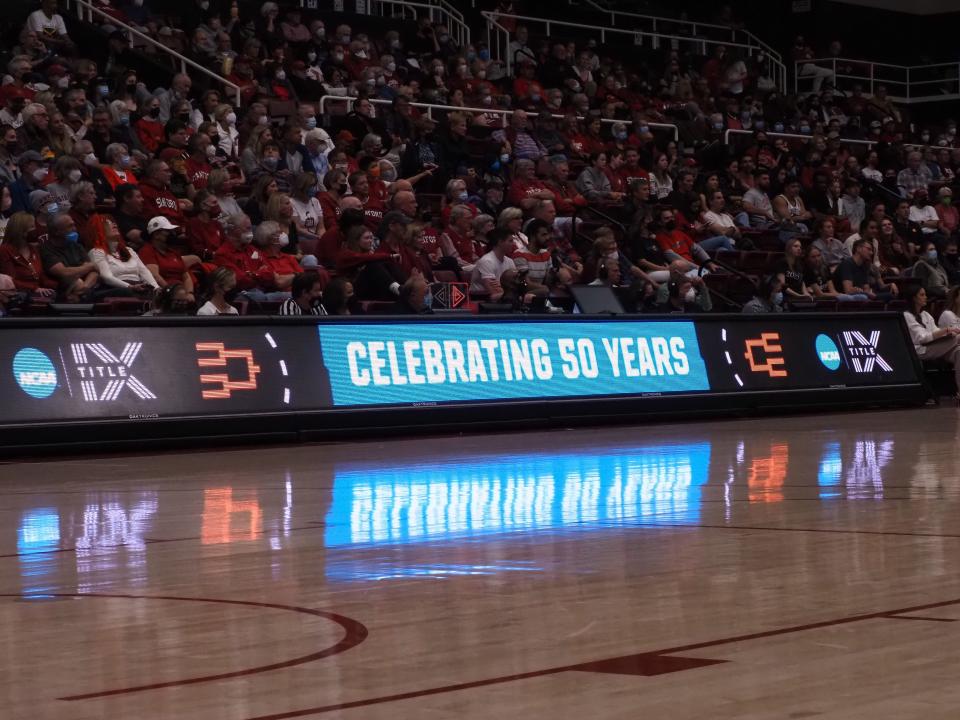Fifty years of Title IX: Equality isn't such a terrible thing, you know? | Michael Arace
- Oops!Something went wrong.Please try again later.
Fifty years ago this week, President Richard Nixon signed into law the Education Amendments of 1972.
In his signing statement, Nixon said: “This legislation includes comprehensive higher education provisions, authority for a new effort to revitalize our educational research effort and authority to provide financial assistance to school districts to meet special problems incident to desegregation.
“It also contains provisions supposedly directed at limiting court decisions dealing with busing. These provisions, however, are inadequate, misleading, and entirely unsatisfactory.”
Nixon went on to outline, at length, his displeasure with Congress for not putting a moratorium on the desegregation of school busing. Hey, it was an election year.
Nixon did not mention Title IX, a single sentence buried in the fat omnibus bill like a sequoia seed in a field of grass. He did not foresee the staggering growth and strength of the measure. Nobody really did, except for maybe Billie Jean King.
Title IX reads as follows:
“No person in the United States shall, on the basis of sex, be excluded from participation in, be denied the benefits of, or be subjected to discrimination under any education program or activity receiving federal financial assistance.”
Fifty years later, Title IX is often referred to – in various texts and documentaries – as “37 words that changed America” or “37 words that changed everything.”

As Billie Jean King likes to mention, “Title IX remains the only law that grants women any kind of equality in America.”
Title IX impacts access to higher education, career education, education for parenting and pregnant students, employment, learning environment, math and science, standardized testing and technology. This is to say that it has created the more equitable environment our daughters now take for granted.
Title IX’s greatest impact – or, at least, its most visible – is in athletics. Its brand is sports. Say “Title IX” and most people conjure a playing field that is more level.
Janine Oman, Senior Deputy Director of Athletics at Ohio State, is not old, but she experienced the day when the only law that grants women any quality in America went into action.

“I started high school in 1977,” Oman said earlier this year, during a Title IX panel discussion hosted by the Columbus Metropolitan Club. “I was competing with the boys before Title IX became mandatory (in 1978). I ran in the first Ohio state track meets for girls.”
Also on that Columbus Metropolitan Club panel were Dr. Kimberlee Kiehl, Associate Executive Director and COO of the Ohio High School Athletic Association; Linda Logan, Executive Director of the Greater Columbus Sports Commission; and Dawn Stewart, Vice President of Student Affairs and Director of Athletics at Otterbein University.
Kiehl’s high school calculus teacher asked her to stop answering so many questions in class because boys don’t like that; Logan’s high school didn’t have girls sports; and Stewart, who stands on the shoulders of her mothers, is a blessed child of the 1980s who grew up with the new normal.
“Sport is, we always say, a learning lab for life,” Oman said. “They’re going to learn how to be on a team, they’re going to learn how to deal with conflict, they’re going to learn ways to lead in a group dynamic – which is valuable in a business setting. When you restrict that, you’re saying, ‘only these people are worthy,’ and you’re restricting that path.”
According to a 2017 study by the consulting firm Ernst & Young, 94% of women who hold C-suite (high-level executive) positions are former athletes and 52% of them played a competitive sport at the collegiate level.
As longtime, distinguished sports journalist Steve Wulf chronicled upon the 40th anniversary of Title IX, the 37 words that changed the world were inserted into the Education Act of 1972 surreptitiously.
The story actually begins with the Civil Rights Act of 1964 (which, one would hope, will not be ultimately gutted like the Voting Rights Act of 1965, but I digress). The Civil Rights Act addressed equal employment opportunity but did not apply to educational institutions, among other things.
Bernice “Bunny” Sandler was among the precious few who noticed this. Sandler, a part-time lecturer at the University of Maryland, had applied for a tenure-track position and was told she “came on too strong for a woman.”
Within two years, Sandler was working with two congresswomen, Edith Green of Oregon and Patsy T. Mink of Hawaii, to bring equal opportunity to educational institutions.
They worked quietly. At the time, a battle was raging (in many ways, it still is) over an Equal Rights Amendment to the Constitution. The crafters of Title IX didn’t want the angelic anti-feminist Phyllis Schlafly aiming her pearly white smile at them. They just wanted to get something done.
Green slipped the 37 words into the big education bill. Mink introduced the bill to the house. Birch Bayh of Indiana introduced it to the senate. The word “sports” was not among the 37 words.
As Sandler told Wulf in 2012, “The only thought I gave to sports was, ‘Oh, maybe now when a school holds its field day, there will be more activities for the girls.”
In 1972 around 300,000 girls participated in high school sports, according to the Equity Resource Center. In 2019, pre-pandemic, that number was 3.5 million.
In 1972, around 30,000 women competed in college sports. In 2019, that number was approaching 200,000.
Saturday marked the 50th anniversary of the second Watergate break-in, the one that caught the notice of Woodward and Bernstein, and brought down Nixon’s presidency.
Thursday marks the 50th anniversary of Nixon’s signing of the Educational Amendments of 1972, which he described as a failed effort to end busing. He missed Title IX in there.
The NCAA did not miss a thing. It began pushing back against Title IX almost immediately.
It came around, eventually. Equality isn’t such a terrible thing, you know?
This article originally appeared on The Columbus Dispatch: Title IX impact: 50 years on, how women's sports have changed

